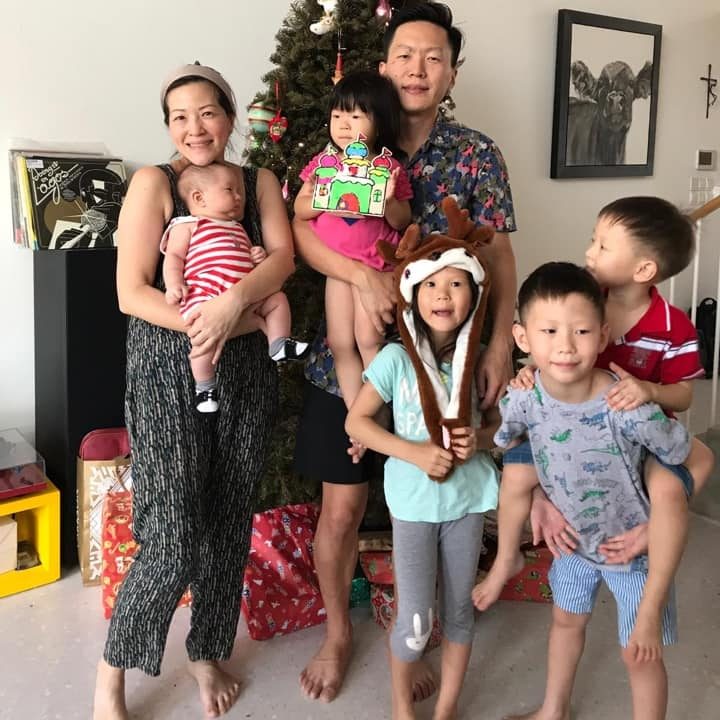The post “The Curriculum is just the Guide” – Behind the Scenes with the Saturday Kids Product Team appeared first on Saturday Kids | Coding, Digital Literacy for Kids & Parents.
]]>Find out what that means in this conversation with Fong Yee and Damar from the Saturday Kids Product team, and stay for a sneak peek at what’s comin’ up in 2022!
Hey big kids! Could you introduce yourselves and share how you work together to create products as Saturday Kids?
Fong Yee (FY):
“In terms of curriculum, I usually manage the camps for preschoolers and for kids ages 7-10. Damar, being more technical, runs Minecraft camps and the camps for kids ages 11-14.
But our strengths are very different!”
Damar (D):
“I’m more restrained than the average person and carefully think out options before acting on them.
Fongyee complements me by being more of a freethinker who comes up with great ideas and thinking outside the box. I keep her on the ground if she thinks of something that is not very feasible.
FY:
“That’s quite true! Damar is very systematic and reminds me to think through of all the factors for consideration.
Our skills are so different.
It sounds cheesy, but we both share the spirit of Saturday Kids.“
Could you unpack that? What is the spirit of Saturday Kids?
D:
“To me, a Saturday Kid is someone who likes to ask questions. Remember how as a kid you’d keep asking “why”? Unfortunately, a lot of us lose that quality as we grow up.


The spirit of Saturday Kids is to embrace and connect with kids’ curiosity.”
FY:
“Apart from curiosity, it’s also about adaptability.
We’re always on the lookout for that in instructors. But they don’t just have to be curious and technical; they have to be adaptable and really internalise the idea that we are not a coding school.
The tools that we teach kids to use are tools to exercise their imagination.
Of course instructors are there to teach the class, but it’s so important that they’re not bogged down by the technicalities of this. The curriculum is just a guide.
As an instructor you’re going to meet so many kinds of students – students who’ll finish everything, who’ll finish 80% of things. What students present on the last day of class is not the end goal at all.
An instructor’s goal is that a child’s first experience with learning how to code should not be a traumatic one. It’s not about coding, it’s about cultivating their mindset towards learning.


We’ve all had that experience of growing to hate math or playing the piano because of a teacher who taught us to internalise that we’re not good at it; that I can’t do it because I’m just not a math person or that I’m just bad at art.
It sounds like an exaggeration, but that initial experience potentially really changes your life.
I always tell instructors, not completing the curriculum is not an indicator of how good an instructor you are; your job is to match your students’ pace.”
What inspired these convictions about how kids should or should not learn?
FY:
“It stems from personal experience, and recognising both that it take so much to unlearn harmful mindsets and that it’s possible for kids not to go through that at all.


That’s why we’re passionate about creating a better environment for kids’ learning, so they don’t have to grow up having to unlearn all these learning traumas that come with being constantly judged and assessed.”
D:
“I can definitely relate to some of the kids I teach. There were times in my childhood when I felt a little suppressed and didn’t always get to express myself in the ways I wanted.
As an instructor, maybe I can help other kids to express themselves, to have fun while learning, and have fun doing things that they like.


Coding is just a tool, right? It’s a relevant tool that helps kids learn how to learn, logical thinking, how to decompose problems and how to solve them, in addition to technical skills.”
What can we look forward to from Saturday Kids in 2022?
D:
“Better products from us… improvements everywhere! As a curiosity school, I think it’s important for us to go beyond developing kids’ technical competencies and to equip kids with other skills like public speaking and design thinking.


I’m excited about the launch of Meta Tinkerers – I can’t wait to see what kids will create using Viviware.
I’m also really looking forward to launching Ready, Set, Python! It should be lots of fun – we’re trying a lot of new things – from computer vision, data science, to artificial intelligence using Python programming. Kids can learn how to use these as tools to create in the future. This new programme’s not just about learning how to code, but also discovering how the world uses Python.”
Kids are innately curious, but as we grow up it can be hard to protect and nourish our curiosity. How do you stay curious as adults?
FY:
“Spending time with kids helps! Working at Saturday Kids really keeps me young – being with kids is very grounding. Kids are the most original thinkers.
Even as much of my time is spent designing new camps and curriculum, teaching regularly helps me stay in touch with my inner child.”
D:
“I have to agree with Fongyee on that! I feel very thankful and blessed to be able to do this as a job – to interact with kids who come up with these wonderful ideas and who have all this imagination.”
Read more from Fong Yee and Damar, and get to know the rest of the big kids. If our approach to learning resonates, we’d love to hear from you – come experience why #SaturdayKidshavemorefun online or in person or say hello.
The post “The Curriculum is just the Guide” – Behind the Scenes with the Saturday Kids Product Team appeared first on Saturday Kids | Coding, Digital Literacy for Kids & Parents.
]]>The post Practicing What We Preach: My Journey as a Curriculum Developer at Saturday Kids appeared first on Saturday Kids | Coding, Digital Literacy for Kids & Parents.
]]>As I conclude my time with Saturday Kids and embark on the next stage of my career, I’d like to share what it’s like to get kids excited about pursuing big questions, solving problems, and seizing the opportunities of a VUCA (volatile, uncertain, chaotic and ambiguous) world.
Teaching Creativity through Coding
A lot of people see coding as a vocational skill that’s necessary for the future.
Some might opt to teach their children coding out of fear that they might lose out or fall behind. This is the sort of impulse that Saturday Kids does not feed into, and the reason I joined the team.
Our philosophy is to teach children to deal creatively with uncertainty and change. We want both children and parents to realise that being a creative thinker will not only bring them economic rewards but also joy, fulfilment, purpose and meaning. Coding is one of the tools we use to help children access their creative potential.
Balancing the Demands Of The Market with Our Values
Although new technologies have transformed existing industries and led to the creation of new ones, the education industry has not changed much in the last few decades. New technologies are being used in schools, but the core structures and strategies of most schools remain the same. Schools are stuck in an assembly-line mindset where children are delivered bite-sized pieces of the same information that were delivered to their parents and grandparents.


It is challenging for children to develop as creative thinkers when they are mostly occupied with maintaining their positions in the standardised examination rat race. What we at Saturday Kids do is a balancing act between giving the market what it wants, a way for kids to acquire a vocational skill relevant to the rat race while also carving out a space for them to develop as creative thinkers.
Designing learning experiences for these two competing needs is complicated to say the least.
You could easily teach children programming concepts or how to build a website, a game or an app, say that they learnt a future skill and call it a day. It’s a lot harder to teach them how to use these skills to come up with something original of their own. It’s a lot harder to help them understand the relevance of what they learnt in different contexts.
We were motivated to create our year long programmes for that reason. Code Meets World was my response to the question of equipping kids with a future-proofing skill while also giving them the agency to build things they like.
Walking the Talk
The reason I’m passionate about teaching children to seize the opportunities of a VUCA (volatile, uncertain, chaotic and ambiguous) world is because of experiences in my personal and professional life. I turn 25 this year and I’ve worked in programmatic advertising, teaching, software development, coding curriculum design for kids, and I’ll be moving unto curriculum design for the textile and fashion industry. I’m financially independent, live on my own, have a modest business and I’ve had the most wonderful time learning and growing to be the person I am today.
I think all children deserve the opportunity to make a life of their own. A life that they are proud of and which brings them joy and fulfilment. And I believe the best way to do that is help them develop their creative capacities and equip them for life in a rapidly changing world.
The reason we call employees of Saturday Kids big kids is because we are ourselves learning new things and finding our way in the world every day. The values Saturday Kids gave us are the values we want to impart to the children whose creative learning experiences we bring into existence every day.
The post Practicing What We Preach: My Journey as a Curriculum Developer at Saturday Kids appeared first on Saturday Kids | Coding, Digital Literacy for Kids & Parents.
]]>The post Meet the Team: Instructors Damar and Pichamon on Redefining Learning Inside and Beyond the Classroom appeared first on Saturday Kids | Coding, Digital Literacy for Kids & Parents.
]]>Damar Masato Hadisumarto and Pichamon Lertsakuncharoen are just two examples of that. Final year college students by day and rocket launchers (i.e. instructors) at Saturday Kids Japan by night (not literally), they juggle a various interests, responsibilities and opportunities inside and beyond the classroom, recently winning a series of hackathons. Based in Tokyo by way of Indonesia and Thailand respectively, here they share how and why they’re passionate about redefining learning in the classroom and the importance of learning beyond it.
By way of an introduction, what are both of you passionate about?
Damar:
“Wow, that is a big question! I am passionate about programming and education – especially if they are both together. I’m passionate about reinventing the way of learning as well as the future – one that is in the hands of young children, the new generation.”
Pichamon:
“Like Damar, I also enjoy teaching kids – when I see kids learning and growing, it motivates me and makes me happy. I also enjoy business research and marketing.”
What led you to teach at Saturday Kids?
Pichamon:
“I learned about Saturday Kids from Damar and thought that the curriculum was really great.
For example, rather than simply learning from the textbook and following what the instructor tells them to do, Saturday Kids teaches kids to use design thinking and to learn through through hands-on activities. And the kids can do whatever they want using their creativity.
I support what Saturday Kids does, so I really like working here.”
Damar:
“I agree! Saturday Kids doesn’t suppress children’s curiosity and instead embraces it.
In other schools, I’ve seen children’s test scores on the wall – that’s incredibly stressful for the kids. I don’t feel that learning should be like that. Here kids learn to develop a growth mindset, and that’s why I enjoy teaching at Saturday Kids.”
Beyond school and teaching at Saturday Kids, what do you two get up to?
Pichamon:
“We recently participated in two hackathons together.”
Damar:
“Our first hackathon – the Infinity Blockathon – was in Vietnam but held online. The challenge was centered around the medical supply chain in developing countries, and we came up with a block-chain based solution. Most of the other teams participated offline because they were in Vietnam and we were the only team participating online, and ultimately we managed to win the challenge!

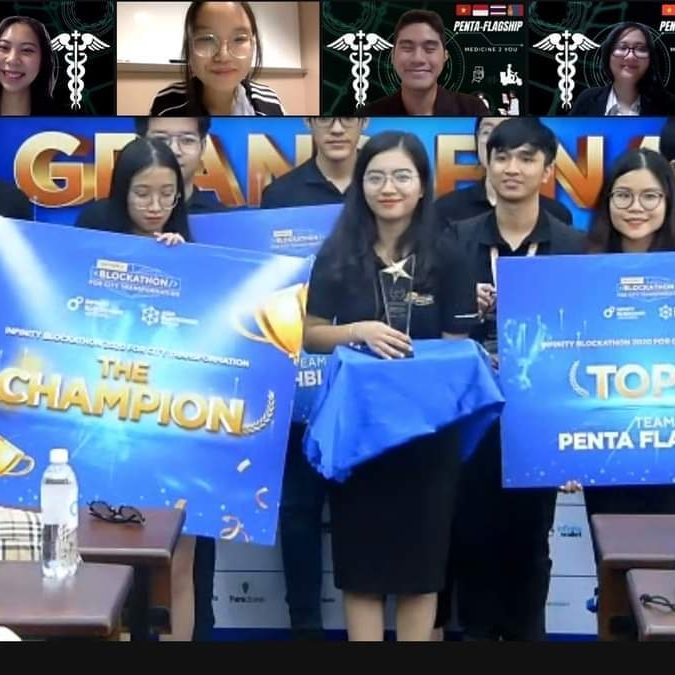
Our second hackathon was launched by Mitsubishi Fuso – a truck company aiming for zero carbon emissions by 2030 and looking for ideas to achieve that goal. Fortunately, we were able to win again.”
That’s amazing. What made you want to take part in these hackathons, despite your already busy schedules?
Pichamon:
“My friend told me about these hackathons and invited me to join their team.
I thought, this is already my last year in university already – why not do something memorable with my friends, have some fun together, and see if I can learn something new along the way?”
Damar:
“I knew that with this team we could do something really great, that’s why I felt that it was a great opportunity to participate in something together. We are all fourth-year university students and almost going to graduate. So although we were quite busy at times, I felt that it’s a really good chance to experience something we are all passionate about, and have a last big adventure together.”
Pichamon:
“Yes, because participating in big events like these are not things you can do after you graduate. Once we start working, we can’t do these sorts of things again.”
What did you learn in the process of participating in these experiences beyond school?
Pichamon:
“I learned how to manage time better. Because we had a time limit to work on everything, we needed to do everything quickly. Moreover, I learned to have trust in your friends – that they’ll do their part while you’re finishing your own parts, so we can make something great together!”
Damar:
“Teamwork is very important. And the most memorable takeaway wasn’t just thinking of new ideas, but actually implementing and doing them.
Pichamon:
“I learned a lot through my work teaching at Saturday Kids, too. When I first started, I had no experience and so was trained by other instructors here. They always motivated me; even when I made mistakes, they would remind me that it’s not the end – there’s always time for improvement and to learn from my mistakes.
I realised that in order to be good at something, it takes time to learn and try and try again and adapt, and for that you need perseverance.
I think I’m much better than how I was when I first started off at Saturday Kids.”
What inspires and motivates both of you to do so much outside of school?
Pichamon:
“I feel that there’s a lot more to learn than what schools can teach you.

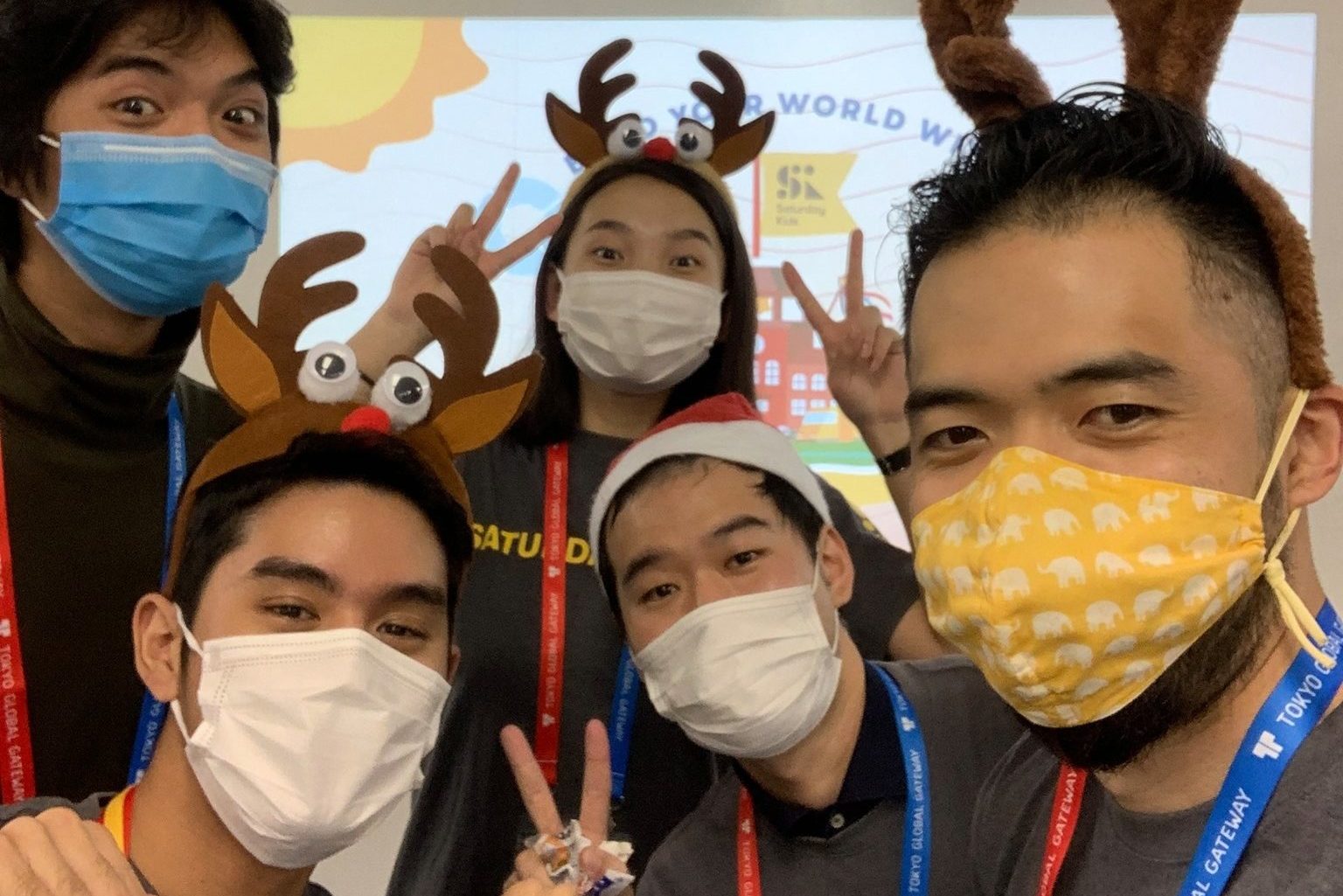
Not everything is confined to what you’ve learnt in school – participating in all these events and activities gives you a lot of experience. For example, when dealing with kids, you can learn how to adapt to certain situations. Sometimes, not every kid can always understand the same set of explanations, hence you must learn to adapt, and from there you can learn many new skills. Mentorship, the new knowledge you gain from people who work in actual companies, the advice they give you – schools don’t teach you these things, you can always learn new things through different experiences.”
Damar:
“Other than gaining new skills – students should make use of their privileges as students as much as they can!
As a student, there are so many different privileges that you won’t be able to receive once you graduate – and, no, I’m not just talking about student discounts. If people know that you are a student, they are more likely to help you out. Once you become a working adult, I think that sort of privilege slowly runs out.
You should really take advantage of this as much as you can, for as long as you can.”
If you’re keen to join our crew of rocket launchers inspiring kids to use code to create a better world, keep an eye on our socials for openings or shoot us an email. There’s always room for more curious big kids onboard our rocket ship to reinvent how kids learn through digital literacy.
The post Meet the Team: Instructors Damar and Pichamon on Redefining Learning Inside and Beyond the Classroom appeared first on Saturday Kids | Coding, Digital Literacy for Kids & Parents.
]]>The post Meet Shreya & Michael, the social impact squad behind Code in the Community appeared first on Saturday Kids | Coding, Digital Literacy for Kids & Parents.
]]>Today, Code in the Community has impacted 2000 kids in Singapore and counting through free coding classes – getting them excited about the potential of tech via Saturday Kids’ Scratch and Python curriculum and more importantly, inspiring them to learn how to learn. It takes a village to make a real impact, and driving this – alongside our tribe of volunteers, sponsors, and partners – is a small team at Saturday Kids. Behind each class and kids’ happy faces lies months of planning, strategising, and a mountain of hard but necessary work. Get to know Shreya & Michael from the social impact squad who share their stories, take us behind the scenes, and help us understand how and why programmes like Code in the Community make a difference.
What’s your story and how did you get involved with Code in the Community?

Shreya, Michael & some of the other members of the Saturday Kids team at the Code in the Community graduation ceremony at Google
Shreya:
“I learned about Code in the Community after joining Saturday Kids and found it really interesting, so I asked if I could come on board.
It’s been good – of course it’s stressful – you need to make the numbers, and programme management is no joke.
But on a high level it’s satisfying – on Week 1 and Week 10 you see the kids all excited and their parents are so proud of them, and throughout the 10 weeks you see all the stories that come out of the programme. It’s very meaningful and I’m quite happy I got on board.”
Michael:
“When I was young, I was from an underprivileged family and was on the Financial Assistance Scheme (FAS), so I’m happy that I now get to help other FAS kids. I don’t think we had many chances like this in the past.
It is stressful – the higher the student numbers, the more volunteers I need. It’s hard because people are forking out their time for free, but in a sense I also realised there are so many people passionate about helping the less fortunate… it’s heartwarming to see that.”


What goes into running a programme on such a large scale?
Shreya:
“On a regular day, I check student registrations, make sure kids are means-tested, tweak collaterals and our website, reach out to partners and organisations to get them on board. Closer to the run, we’re lugging Chromebooks everywhere, syncing them to wifi, buying what seems to be like a hundred extension cords, packing welcome packs and stuff for the kids to take home.
From a big picture perspective, it doesn’t look like a lot. But the amount of time and the attention to detail it takes for the programme to run smoothly is mind-boggling.
It’s also great to have everyone from Saturday Kids chip in and help when they can. It really takes a village, and CITC is my baby.”
Michael:
“Once locations, venues and sessions are confirmed, I look for volunteers. Our Product team helps to check the coding projects that volunteers submit as part of their application and I assign them to the sessions they want. The tough part is never knowing which locations will be confirmed or cancelled until the last minute – this involves a lot of reshuffling, and making sure everyone knows what they’ve committed for.”
Shreya:
“I’m forever at meetings.”
Michael:
“I’m forever running around.”
What inspires you to do what you do?
Shreya:
“I’m inspired by the parents who write in and are really keen on sending their kids to class; the kids who are willing to travel across the country for our classes; kids who are so inspired after 10 weeks that they want to do more.
And the volunteers who give up their weekends – some volunteer from 11am to 6pm on a Sunday. Some share it with their friends and they come together to volunteer. It’s a nice feeling that people in Singapore are passionate about stuff besides work and making money. You also realise that so many kids out there qualify for the programme and really appreciate the opportunity to be a part of it, and that makes you aware of the privileges you had or didn’t have growing up.”
Michael:
“We see increasing returning volunteers – they’re not doing it to count towards their school’s Community Involvement Programme (CIP), or for the small stipend, or for it to look good on their cert.
For example, we have a 15 year old returning volunteer – Jonathan – who started as an assistant because he wasn’t experienced enough – he told us once that he would one day become a lead instructor, and now he’s a Scratch Instructor leading a large class. At the beginning he told us, “I’m not very good at this right now, but I will be at the end of 10 weeks.”
There are many others with busy regular jobs and families, and they still wake up so early on the weekends – who does that?!
We have some very passionate volunteers teaching at Code in the Community – seeing how kids respond in class is a testament to how good an instructor is.
My high point is the graduation ceremony – you see a lot of happy faces. I’m happy because the kids are happy and the volunteers are happy. That’s the most important thing at the end of the day.”


Why should someone volunteer for Code in the Community?
Shreya:
“You get to give back to the community and help a generation grow, looking forward. Volunteering for Code in the Community is a way of using your privilege or opportunity to help another kid go forward.”
Michael:
“Volunteering comes in a lot of ways – you can clean a beach, help elderly folks in a care centre.
To me, children are the world’s best resource, they are the ones that drive the future. If you can empower those who don’t have financial capability and get them on the same playing field as the rest of those who have the privilege of owning computers and iPads, it just makes the world a better place. We might never defeat the poverty cycle, but we can try our best to make it smaller.”
Shreya:
“At the end of the day, you’re empowering a kid and giving them the opportunity that might lead to a better life. I don’t know how many of these kids will go on to become programmers, but if they enjoyed those 10 weeks of coding and it’s left a positive impression in their mind…I hope they remember what it feels like to learn how to code, and they remember that feeling of achieving something.
I hope that when they grow up and face challenges, they’ll always remember this program and the accompanying feeling of accomplishment, and I hope that motivates and inspires them.”
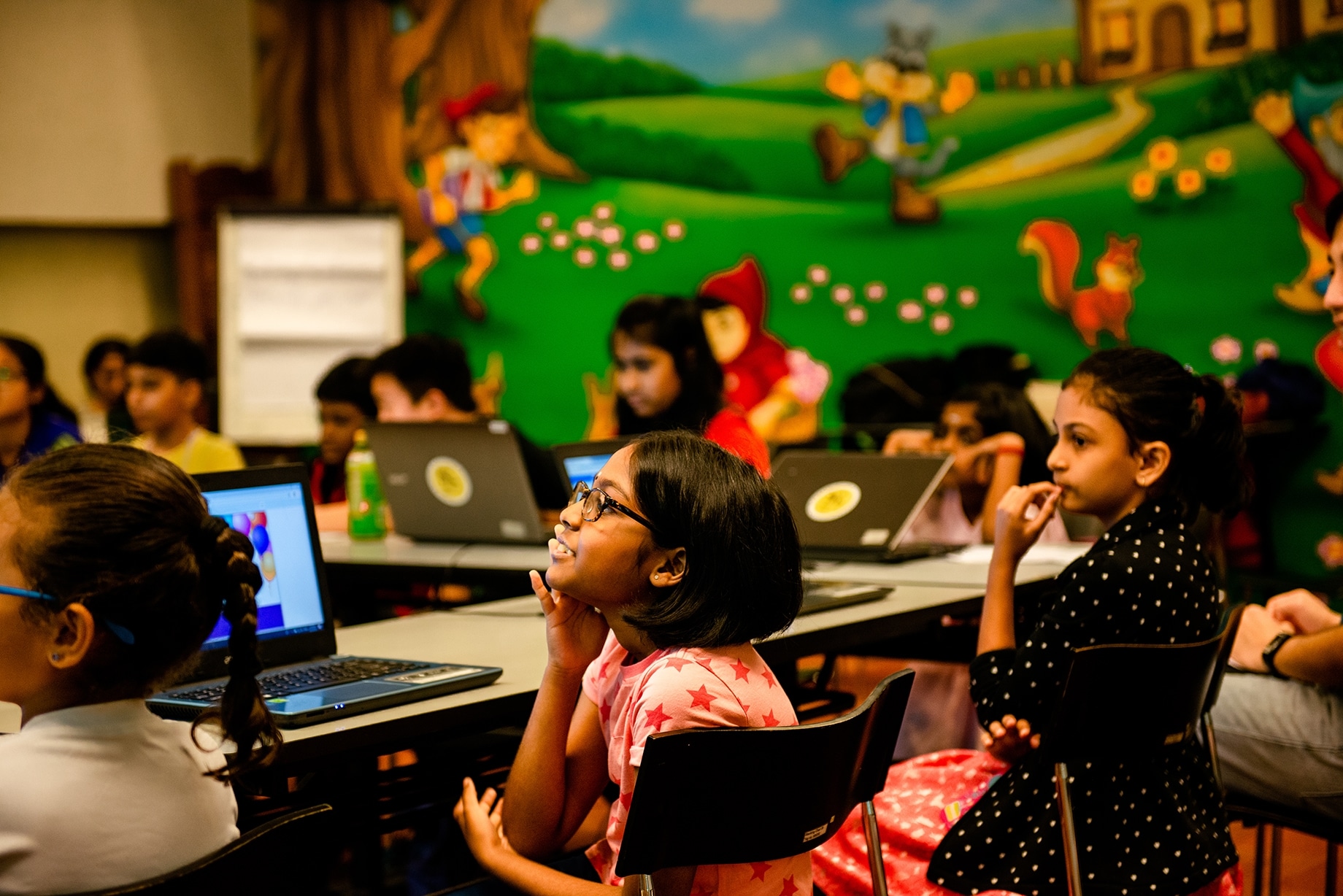
A snapshot from Scratch class at Geylang East library.
Why should kids take part in Code in the Community?
Shreya:
“Think of CITC as a launchpad for kids’ digital learning. It’s a small class, they learn and benefit from more interaction with instructors; meet kids from different backgrounds kids who may be from similar backgrounds.
Moreover, it’s absolutely free of charge; our volunteers and classes are pretty fun; and it’s about letting your kid experience what coding is like, experience making a project for themselves, and feeling a sense of accomplishment at the end of the day.”
Michael:
“The trend now is programming, machine learning, artificial intelligence – it’s important for kids to start now that it’s free, otherwise how will they catch up further down the road when everyone else has already moved on? This is the easiest way to get equipped with the skills they might need in the future.”
. . .
Code in the Community is a Google-sponsored program which aims to get Singaporean kids from lower-income families excited about technology’s potential and unlock their natural learning abilities. Interested in being a part of something bigger? Register as a student or volunteer instructor here!
This interview is a part of our #codeinthecommunity series of articles exploring what it means and takes to create access to computer science and computational thinking for communities that might not typically have these opportunities.
Check out the other stories in the series:
When we teach kids how to code, what do they learn, really?
Meet (some of) our Superstar Volunteer Instructors
The post Meet Shreya & Michael, the social impact squad behind Code in the Community appeared first on Saturday Kids | Coding, Digital Literacy for Kids & Parents.
]]>The post Because Mums make the world go round – Happy Mother’s Day! appeared first on Saturday Kids | Coding, Digital Literacy for Kids & Parents.
]]>Working mothers aren’t given the credit they deserve for all that they bring to the workplace by dint of their parenting experience – this satirical job description from the New York Times just scratches the surface of the value that mothers bring to a team.
At Saturday Kids, we’re thankful for our all-star team of Mums who further our mission to make kids curious self-directed learners; this Mother’s Day we’d love for you to meet them, and for you to show some love to the mothers and mother figures in your life and at the workplace.
. . .
Beyond her role as a Rocket Launcher (AKA curriculum developer) at Saturday Kids, Huda also helps to run the Codette Project which creates access for minority women to opportunities in tech.
(Check out her blogpost about why we should care about getting more girls in tech!)
Trust and treat a child as a person, not just a child.
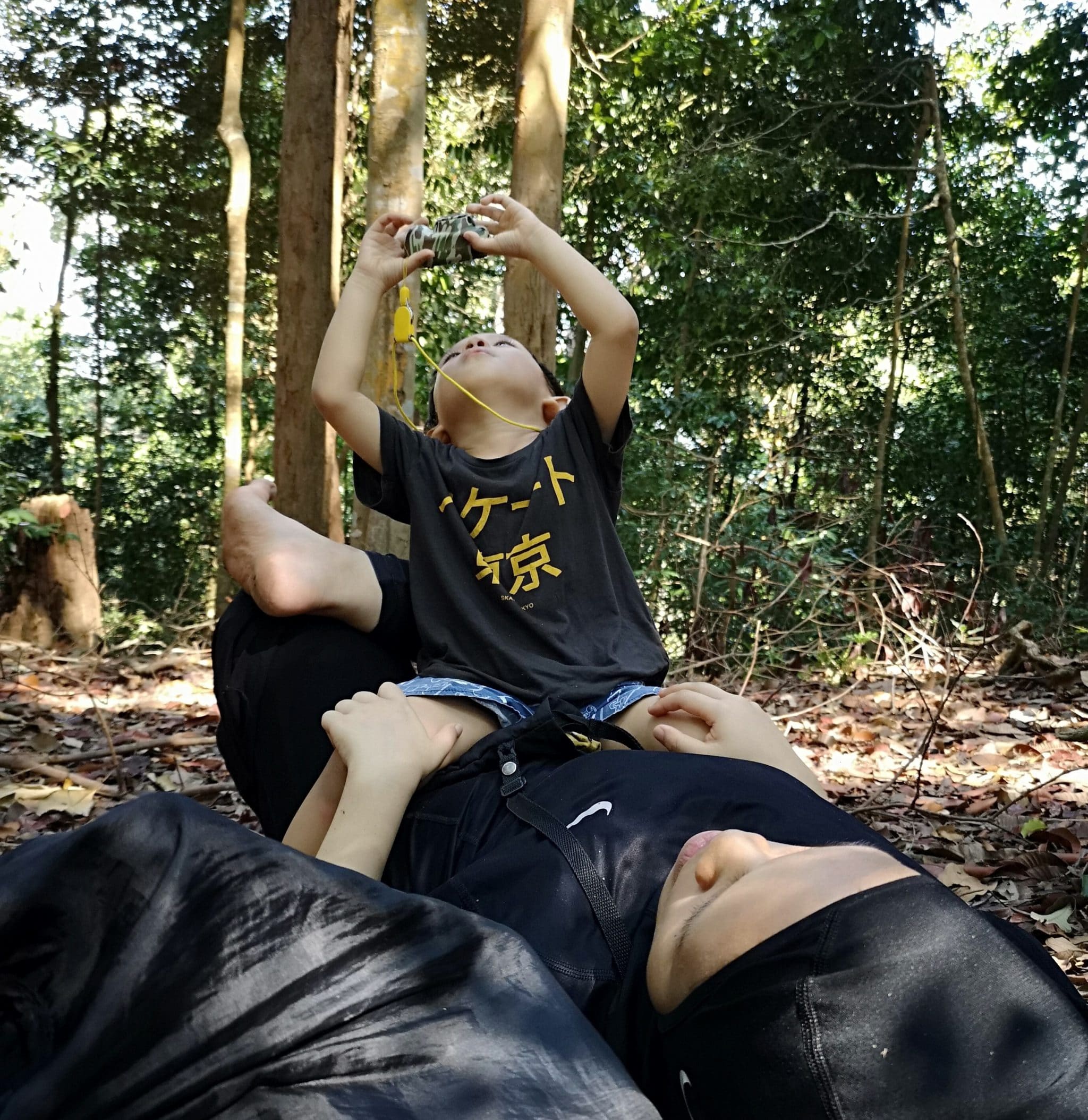
What’s your superpower?
Having Cephalopod limbs (AKA octopus tentacles) because I have to do 3000 things in a day.
What do most people not know about being a mother?
One can never be ready to be a Mom.
What have you learned from your kid?
To trust and treat a child as a person, not just a child, which in turn requires you to respect them. And… I never knew how much patience I’d need to raise a child.
. . .
Besides supporting Saturday Kids’ financial operations, Maryanne is also a full-time lawyer and mother of five.
You just can’t give up. And you won’t.

What’s your superpower?
Bullet-journaling!
What do you think most people don’t know about being a mother?
It’s a lifelong commitment. It’s a job you can’t quit no matter how difficult it gets or how difficult the kids get. You just can’t give up. And you won’t.
What’s something you’ve learned from your kids?
Bad jokes. And some good ones…
Latest joke: What do sea monsters like to eat? Answer: Fish and ships.
. . .
Nadiah assists classroom operations at Saturday Kids, ensuring that all classes run smoothly and without a hitch. She’s also a proud Mum to 3 kids ages 16, 13, and 3.
Although I have gone through a hard life all my years I’m still going on strong today as a single Mum.

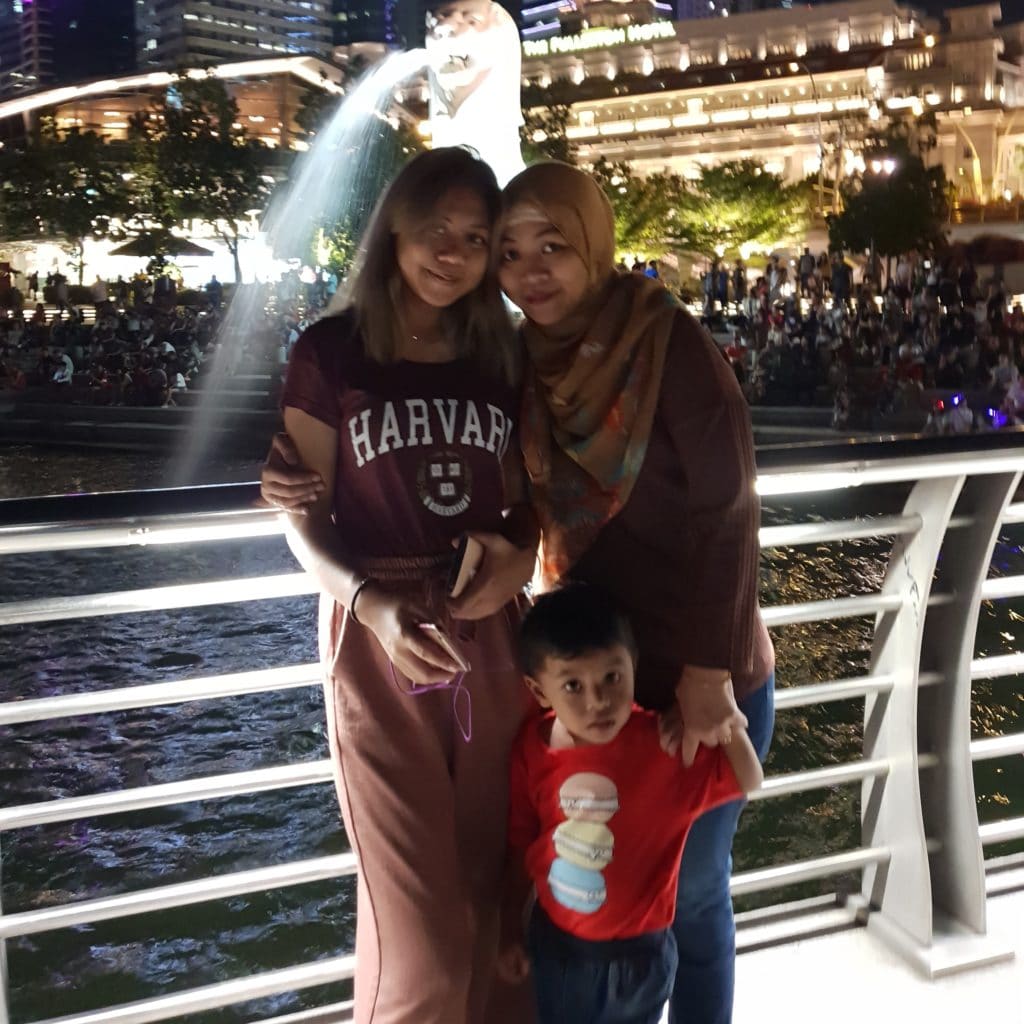
What’s your superpower?
My superpower is that I am a strong and independent mom – although I have gone through a hard life all my years, I’m still going on strong today as a single Mum. I’m a strict mother, but I still try to blend in with my 16 year old daughter and at times am a Mum, sister, and friend to her when she needs advice and faces problems.
What do you think most people don’t know about being a mother?
Some people think being a Mum is easy. It’s definitely not because it’s just the start of bringing up your kids, whether you have a partner or you’re single. There’s both happiness as well as burdens to go through.
What’s something you’ve learned from your kid(s)?
I’ve learned that I can’t be too harsh on them if I want them to listen, and that meting out punishments doesn’t resolve issues and isn’t the way to handle things. I’ve learned to coach and guide them when they need help in uncertain matters.
Most importantly, my kids want to feel care and concern for their well-being so they feel welcome to ask me anything regarding matters of life.
. . .
A mum to 2 twin girls, Nicole heads Marketing at Saturday Kids and pursues her passion and talent for visual storytelling in her free time (what’s left of it).
I didn’t realise I have the capacity to love SO FREAKIN’ MUCH.
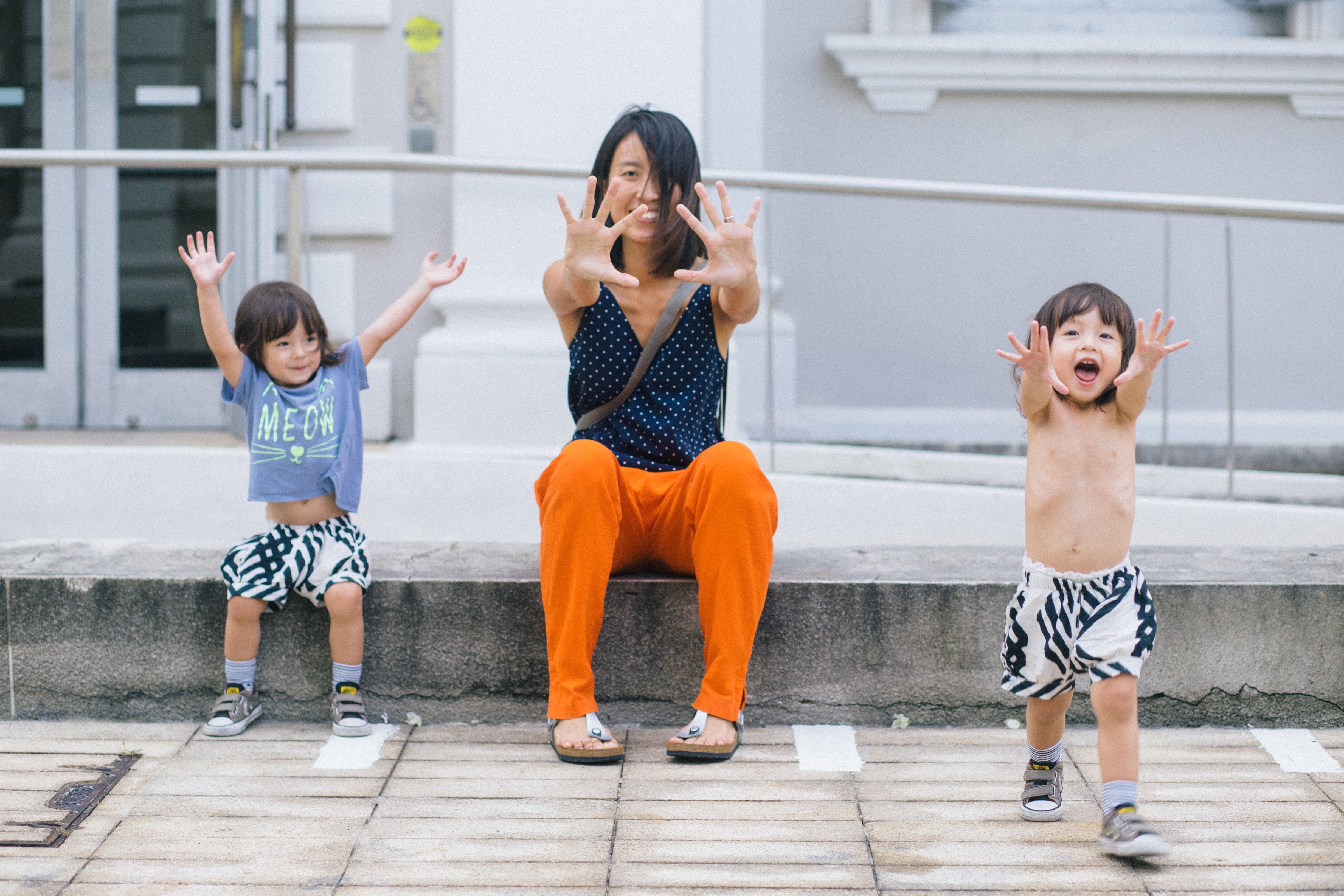
What’s your superpower?
I am the only one in the family who can easily tell my (fairly identical) twins apart even without looking at their faces! No kidding 
What do you think most people don’t know about being a mother?
For me, I didn’t realise that I have the capacity to give and love SO FREAKIN’ MUCH even on a lousy day, perhaps especially on a lousy day – until these two came along.
What’s something you’ve learned from your kids?
Never take no for an answer the first time around.
Plus – EVERYTHING IS INTERESTING.
. . .
An investment banker in her previous life, Sam heads International Programmes in Japan while being a dedicated Mum to 3 kids ages 5, 3 and 1!
My superpower is living with my heart outside my body.
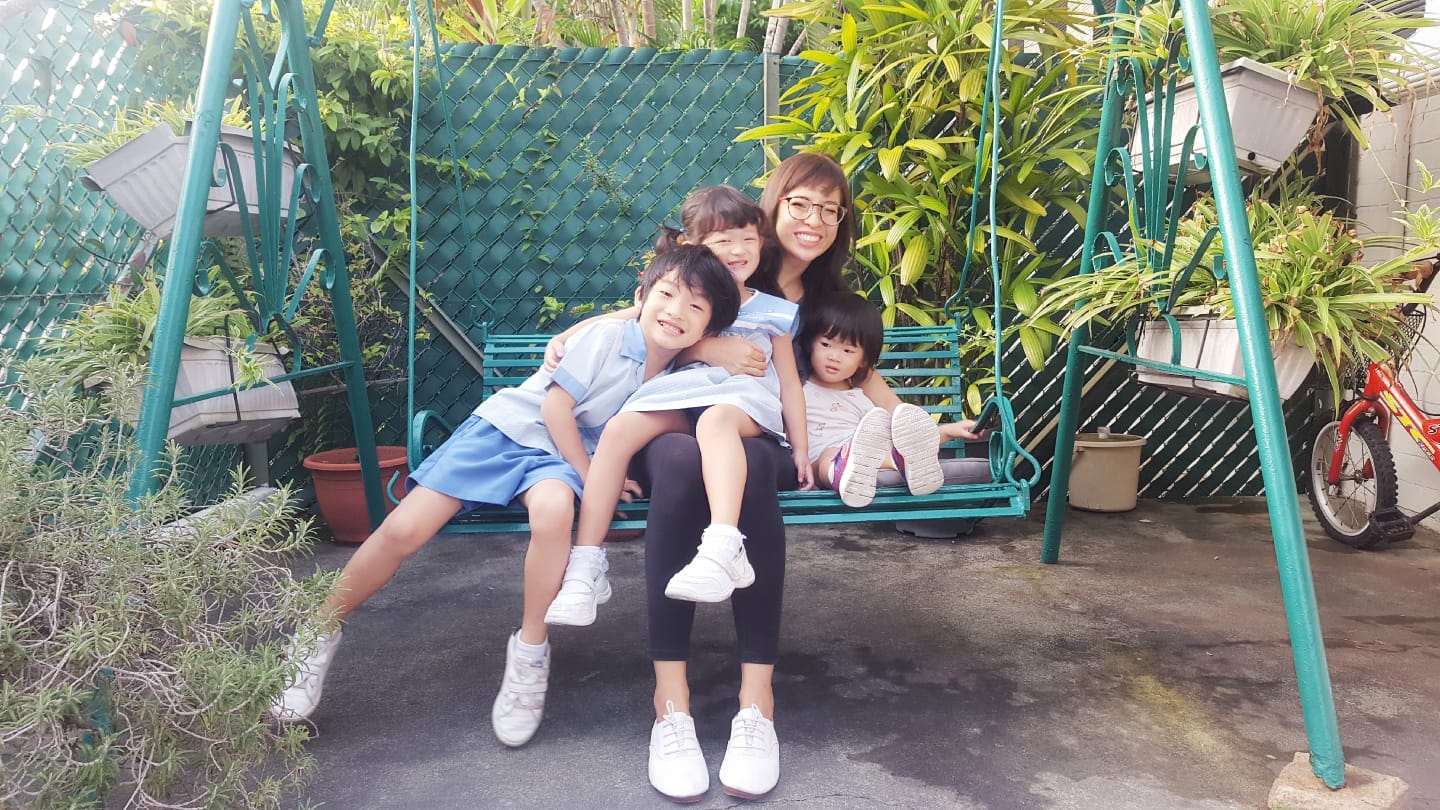
What’s your superpower?
There is a quote that says having a child is to “forever have your heart go walking outside your body”. So yeah, my superpower is living with my heart outside my body.
What do you think most people don’t know about being a mother?
That most of the time you’re just trying your best to fake being a responsible adult. That chocolate I told you not to eat off the floor? I’m totally eating it as soon as your back is turned… Mommy has a very important conference call and cannot be disturbed? I’m hiding in the bedroom binging on Crunchyroll. Shhh…
What’s something you’ve learned from your kids?
That every day has something worth celebrating.
. . .
Yulin leads our social impact team, running creative coding projects to close the digital literacy gap – including Google-sponsored initiative Code in the Community and Coding Cats in Cambodia – and is a mother to Leon & Isabel, ages 10 & 8!
“Where’s my…?” “Study table, second drawer, blue box.” “How did…?” “Cos I’m your Mum.”


What’s your superpower?
The power of preemption. Preempting quibbles from escalating into full-blown fights. Preempting bouts of ‘h-anger’. Preempting questions – “Where’s my….?” “Study table, second drawer, blue box” “how did…?” “Cos I’m your mum”.
What do you think most people don’t know about being a mother?
The strangest things you worry about, starting from the day they are born.
What’s something you’ve learned from your kids?
Appreciate nature. We take it for granted when we grow up. Until your child points out an oddly-growing tree, the way raindrops meander down a window, the papery skin discarded by an outgrowing insect.
. . .
To the Mums from our Saturday Kids tribe and beyond, happy Mother’s Day! Here’s a reminder to give the mothers we know and love the credit they’re due, today and every day. 
The post Because Mums make the world go round – Happy Mother’s Day! appeared first on Saturday Kids | Coding, Digital Literacy for Kids & Parents.
]]>